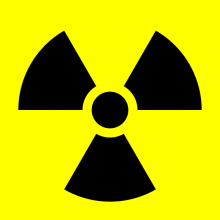
Could North Korea provide Iran with intercontinental missiles for nuclear warheads? Radiation Warning Symbol. Public Domain.
Half the US is in range of North Korea’s latest missile, tested on Sunday, and The Daily Beast reported that the missile not only can hit American soil, but the Koreans have managed to notably reduced the time to fire the missile—and thereby reducing the chances it can be destroyed pre-launch. Furthermore, the “satellite” believed to be a decoy that the missile launched into space is around the same weight as a nuclear warhead.
So what could be worse than a dangerous dictatorship developing nuclear weapons and building missiles to deliver them? How about two such nations. The Daily Beast cited an expert on North Korea, Dr. Bruce Bechtol, who said that the US should be on the watch for signs the North Koreans are selling the advanced missile to Iran. Why would they do that? Because the Iranians are already paying for its development.
The Daily Beast, in a previous article in January, quoted Bechtol as saying that the Iranians are doing their part by financing the missile research.
So it’s not surprising that Israel joined Western nations in condemning the North Korean launch. The Israel Ministry of Foreign Affairs website posted a statement saying, “Israel regards North Korea’s repeated provocations with profound concern and calls on the international community to prevent any further violations, which clearly pose a threat to international peace and security.”
The US even vaguely acknowledged the North Korean threat in the statement condemning the latest missile test issued by the State Department. While it was unclear if the US is saying the missile is a threat or that the test could lead to conflict that could be a threat, the Americans said the test is a “major provocation, threatening not only the security of the Korean peninsula, but that of the region and the United States as well.”
(By Joshua Spurlock, www.themideastupdate.com, February 8, 2016)
